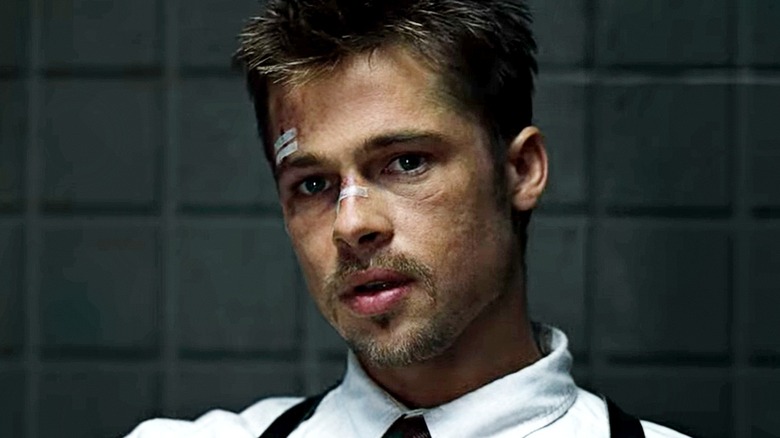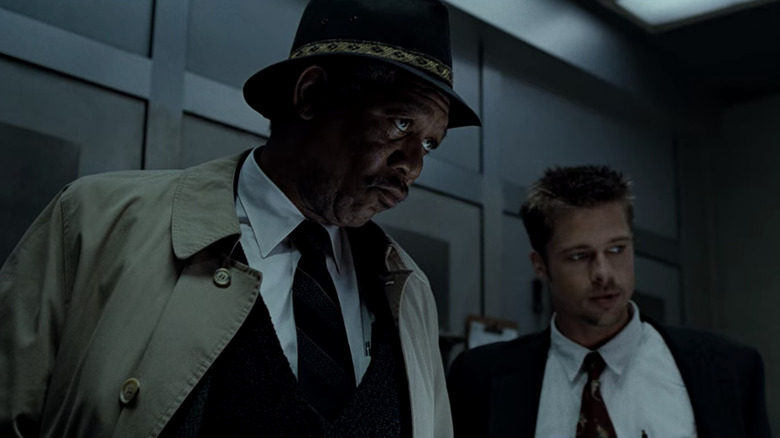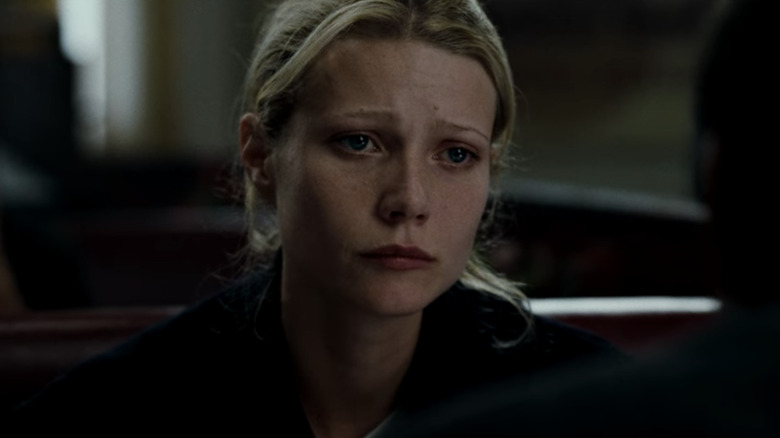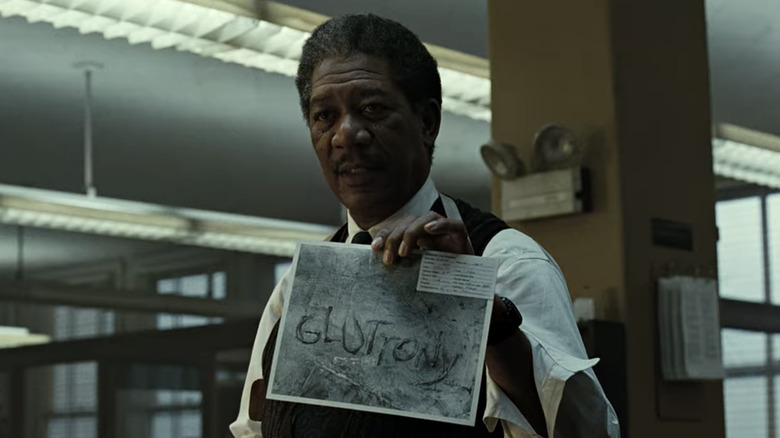The Daily Stream: Seven Is When David Fincher Truly Arrived, And Its Influence Endures
(Welcome to The Daily Stream, an ongoing series in which the /Film team shares what they've been watching, why it's worth checking out, and where you can stream it.)
The Movie: "Seven"
Where You Can Stream It: Peacock (starting November 1, 2021)
The Pitch: Two detectives in an unnamed city investigate a series of gruesome murders symbolizing the seven deadly sins: gluttony, greed, sloth, lust, pride, envy, and wrath. The killer delivers each one as a "sermon," where the punishment suits the sin in the contrapasso mode of Dante's "Inferno." But they're just as much like art installations in a museum of death.
Director David Fincher takes you on a flashlight tour of different rooms, with fat men face-down in spaghetti bowls, UV-light messages finger-printed on the wall, and a lifetime's supply of air fresheners hanging from the ceiling. He also stages shootouts and takes you out on the street in foot chases through the rain, where cops hop over cars in a way that feels positively conventional compared to the rhythms of a more subdued anti-mystery like "Zodiac."
Fincher started out as a music video director and was responsible for several videos that secured heavy rotation on MTV and VH1 in the early 1990s, including but not limited to Aerosmith's "Janie's Got a Gun," Madonna's "Vogue," and George Michael's "Freedom '90." He had a bad experience with his first movie, "Alien 3," and though it does contain glimpses of the greatness that would come from him later, it's one where he ultimately lost creative control. With "Seven," the stifled filmmaker was able to vindicate himself as an auteur. This is his sophomore feature, yet it feels like the first fully-formed David Fincher film.
Why It's Essential Viewing
In addition to heralding Fincher's arrival, "Seven" is the best serial killer movie this side of "The Silence of the Lambs." The mid-1990s were peak Morgan Freeman. "The Shawshank Redemption" and "Seven" easily top the pyramid of Freeman's best roles. As Detective Somerset, he projects a world-weariness in line with that of other Fincher characters: hollowed-out people in a disconnected society where humanity has fallen into shadows and the bad guys live in the light.
With a metronome ticking next to his bed, and "culture coming out [his] ass" at the library (they don't call that Bach number "Air on the G-String" for nothing, apparently), Somerset is the guy who works late when no one else is around. "Anyone who spends a significant amount of time with me finds me disagreeable," he explains.
His new young partner, Detective Mills (played by Brad Pitt) provides the perfect foil for his fatalism. Mills still thinks he can make a difference. By his own admission, he feeds off his emotions, kicking in doors without a search warrant when he should be listening. This gets him into trouble at the end because Mills refuses to change, unlike Somerset, whose parting words — the world's shortest voiceover — leave us with the glimmer that he now embraces the need to fight for the world.
"Seven" has an engrossing high-concept plot, but it's the character work that elevates it. Somerset's interactions with Mills' wife, Tracy (Gwyneth Paltrow), when she turns to him for advice are imbued with real poignancy. All three actors share a natural chemistry. Even supporting players like R. Lee Ermey and Leland Orser have their moments, like when Ermey's gruff police captain answers the phone with, "This isn't even my desk," and immediately hangs up.
Endings and New Beginnings
"Seven" is not a cipher like "Zodiac" where it's open-ended and you're left to wonder if that one hardware store clerk was the killer. It gives evil a face and an all-purpose name.
Kevin Spacey doesn't come in until the third act, and this is one instance (another being "House of Cards," which Fincher executive produced), where an actor's real-life infamy melds with his character's onscreen villainy in a way that renders him even more loathsome. Suffice it to say, this week, we explored the dark ending of "Seven" through the lens of the alternate ending that Fincher wanted to use. It's still a gut punch — one that lands with thundering finality as helicopters circle overhead in a field of transmission towers and opened mystery boxes.
The plot resolves itself and the credits roll backward, but like a decaying cadaver, "Seven" would fertilize plenty of new beginnings. In 2021, the movie's outsized influence continues to be felt in films like "Spiral: From The Book of Saw" and HBO Max's "The Little Things" (not to mention "The Batman" trailer). Both "Spiral" and "The Little Things" center on veteran Black cops — one's named Zeke, the other's named Deke — who partner up with a younger, more idealistic homicide detective.
Between the two, we get a familiar mishmash of "Seven"-inspired ingredients: blue-lit crime scenes, religious imagery, bar stool conversations, at-home meals with the wife, unlawful apartment entries, a drive out to the desert where the cop impulsively kills the suspect, boxes of body parts (a human tongue, fingers, and skin instead of an unseen blonde head), and Dantean deaths that give the victim a taste of the aforementioned contrapasso. "The Little Things" even casts one of Fincher's two-time collaborators, Jared Leto, in a key role.
Other Copycat Thrillers
Denzel Washington, who co-starred with Freeman in "Glory," turned down the role of Mills in "Seven." He later told Entertainment Weekly that he regretted his decision after seeing the finished film. "They offered me the Brad Pitt part, but I was like, 'This is so dark and evil,'" Washington recalled in 2010. "Then, when I saw the movie, I was like, 'Oh, shoot.'"
A quick look back at Washington's filmography suggests that he's been recouping the loss of that acting opportunity ever since. Consider not only "The Little Things," but also "The Bone Collector" and "Fallen," the latter of which trades sin-themed killings for demonic possession — a fallen angel who jumps from host to host, rather like the muse of "Seven," inspiring copycat thrillers.
The Anthony Hopkins thriller "Solace," streaming on Hulu, began life as a sequel to "Seven," only to be rewritten as a standalone film when Fincher rejected the outlandish idea of Somerset developing psychic powers. Freeman may not have reprised his role as Somerset, but you can tell he really wanted to, and so we have his turn as Alex Cross in "Kiss the Girls" and "Along Came a Spider" instead.
While not explicitly a serial killer thriller, Andrew Kevin Walker, the screenwriter of "Seven," also wrote the script for "8mm," starring Nicolas Cage. The subject matter (snuff films) and grainy visuals take a page from the Book of "Seven" (John Doe's composition book, as it were). It's just one more example of the many films that have imitated "Seven." Knowing the genre inside-out enabled Fincher to subvert a formula he himself helped write with his two pseudo-realistic "Seven" follow-ups, "Zodiac" and "Mindhunter."



